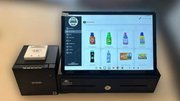News
RFID solution helps retailers improve store operations
June 13, 2012
A Web-based analysis tool built to assist retailers who are assessing the impact of RFID technology on their operations is now available from Impinj Inc., a UHF Gen 2 RFID technology provider.
The company's Store Performance Simulator allows retailers to better understand how variations in inventory management affect performance and profitability, according to a company press release. By simulating shopping activity and store operations while tracking cumulative business results, SPS enables retailers to run a store in the virtual world under thousands of different scenarios while observing cause and effect in ways that are not feasible in the physical world. Users can simulate store performance with or without RFID and with various front-stock and back-stock ratios, supply chain replenishment speeds, customer service levels, stock-taking labor rates and numerous other factors to understand the effect of these parameters on their store's performance. Once validated against current operations, SPS results can drive performance targets for pilot deployments of the modified business processes, Leslie Hand, research director at IDC Retail Insights, said in the release.
"Impinj's Store Performance Simulator is unquestionably the most flexible RFID store operations simulation tool that I have tested," she said. "It enables baseline operational performance comparisons to RFID and other performance improvement 'what if' scenarios, so the retailer can evaluate the quantitative value between adding staff, changing inventory management process, adding inventory and implementing RFID enabled processes."
Developed to leverage low-risk, low-cost simulation to improve retail operations, SPS allows users to create scenarios with more than 25 input parameters that describe how a store, or a product category within a store, operates. SPS then simulates the scenario, recording more than 35 store performance metrics and producing an income statement summarizing the store's turnover rates, unit sales and profits. With SPS, retailers can experiment in simulation with various scenarios, and then modify their operations to yield the expected performance improvements. Most simulations show that by utilizing RFID technology, stores can improve inventory visibility, increase sales and customer satisfaction, decrease out-of-stocks and markdowns, and improve employee awareness of performance.
"Almost all retailers believe that RFID generates significant business benefits, but some struggle to prioritize the technology against other initiatives," said Larry Arnstein, PhD, vice president of business development at Impinj. "We developed SPS so that retailers could compare multiple methods for improving store operations, including the use of RFID technology. Already SPS has provided insights to a major apparel retailer as they modified operations to increase profits."
Impinj has made the case study, "Fast Track to Profits: Using Simulation to Improve Store Operations" available for download at SPS.Impinj.com. Written in cooperation with a Fortune 500 brand owner, the report details the benefits of store simulation and describes how Impinj's SPS predicts the impact on performance and profits from changes to store operations, thus pointing the way toward a new data-driven approach for improving retail operations.
Read more about RFID technology.
 ChatGPT
ChatGPT Grok
Grok Perplexity
Perplexity Claude
Claude




